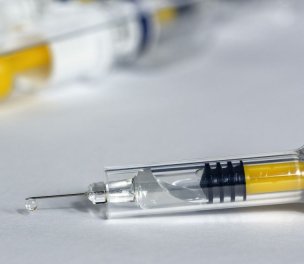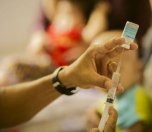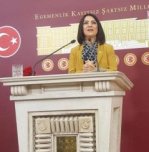* Photo: Anadolu Agency (AA) - Archive
Main opposition Republican People's Party (CHP) Tekirdağ MP Dr. Candan Yüceer has submitted a Parliamentary inquiry to the Speaker's Office and requested that the extent of anti-vaccination in Turkey be inquired by a Parliamentary Investigation Commission.
Raising concerns over the recently growing vaccine hesitancy and anti-vaccination both in Turkey and around the world, CHP MP Yüceer has also requested that the commission determine their causes and effects as well as the precautions to be taken against this trend.
Underlining that several diseases that used to be more prevalent among the public and sometimes claimed the lives of people could now be prevented thanks to the widespread vaccination of the society, the MP has emphasized that a high rate of vaccination is one of the most important tools of public health as it decreases the circulation of diseases and protects both vaccinated and unvaccinated children.
'They are not based on scientific knowledge'
Yüceer has raised concerns over the recently increasing vaccine hesitancy and anti-vaccination among the public briefly as follows:
"The statements that are based on conspiracy theories and superstitions, rather than scientific knowledge, are brought up sometimes on religious grounds, sometimes for political reasons, which ultimately causes anti-vaccination to be more widespread.
"The issue has come to such a serious point that the World Health Organization (WHO) now considers anti-vaccination to be one of the biggest threats to human health. Several diseases which were supposed to be a thing of the past thanks of vaccination programs have resurrected."
'Anti-vaccination increases, epidemics break out'
Yüceer has shared the following information about the situation in Turkey:
"While the number of families who did not have their children vaccinated was 183 in 2010, it is now estimated to be tens of thousands. WHO has been stressing that the number of measles cases, which was 69 in Turkey in 2017, increased to 2 thousand 666 in the first nine months of 2019.
"Turkish Medical Association (TTB) identified a 'measles outbreak in Turkey, which can get more grave if no intervention is made.' The family doctors also express the same observations. They are worried that several preventable diseases, from measles to whooping cough, from polio to contagious hepatitis, can turn into an epidemic aging."
Criticizing the Ministry of Health for "being a mere onlooker regarding these developments", the MP has requested a Parliamentary inquiry "so that this issue, which concerns public health closely, be investigated in its all aspects, the sources and consequences of anti-vaccination and the precautions to be taken against it be determined."
About vaccine hesitancy / anti-vaccination in TurkeyReleasing a statement about anti-vaccination in December 2019, the İstanbul Medical Chamber announced that vaccine hesitancy and anti-vaccination "reached the potential to become a public health problem" because of the confusing statements by both doctors and "so-called investigative writers." The number of families who did not vaccinate their children increased to 23 thousand in 2017 from only 183 in 2010, the chamber noted, citing a statement by the Turkish Society of Clinical Microbiology and Infectious Diseases (KLİMK). In a penal discussion held in March 2019, Pediatrician Assoc. Prof. Dr. Selda Karaayvaz also noted that there were 12 thousand cases of vaccine hesitancy in 2016 and 23 thousand cases in 2017 were reported. 'Once herd immunity is achieved, infection risk is greatly reduced'Infectious Diseases Association Chair Mehmet Ceyhan spoke to the state-run Anadolu Agency (AA) on February 15, 2020 about the increasing vaccine hesitancy both in Turkey and around the world. Commenting on the reasons that lead to vaccine hesitancy in Turkey, Ceyhan said that some some claim the substances in vaccines can lead to autism and infertility, or cause permanent damage to the body. Vaccines are much more reliable than medications, he said, noting that vaccines do not cause autism, nor have an impact on children's walking. "No vaccine alone provides a person with full protection from the disease. However, if the majority of society is vaccinated, the vaccine prevents spreading the disease," he said. Ceyhan went on to say that once herd immunity is achieved, infection risk is greatly reduced: "However, if more than 5% of children are not vaccinated, the proportion of unprotected person reaches 6-8%, together with 1-3% unvaccinated people. In this case, unvaccinated children would be at risk for vaccine-preventable diseases." |
(SD)








